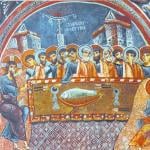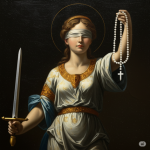::::This post was somehow lost from my archives and is reassembled from linking sites who excerpted quotes. I unfortunately have not been able to fully reconstruct the whole original post:::::
“A gospel that doesn’t unsettle, a Word of God that doesn’t get under anyone’s skin, a Word of God that doesn’t touch the real sin of the society in which it is being proclaimed, what Gospel is that?”
–Archbishop Oscar Romero
The Catholic church teaches some things magnificently, and other things very poorly, indeed. But then again, this institution – though existing through the grace of the Holy Spirit – is still administered by faulty, imperfect humans, and has been from day one, when Christ gave Peter the keys. The church, like Peter, still constantly alternates between thrilling sublimity and moments of “doh!”
I’d rather belong to a church that teaches “the truth throughout the ages and trends” (which are always evolving) than one that teaches “the ages and trends throughout the church.” Such a church will have to continually have to “adapt” and it’s very difficult to suggest you have the “truth” when it keeps changing every year. The Churches that have “adapted” to the times tend to be the ones that have bled-out membership (Methodists and Church of England come immediately to mind). The Church has a responsibility to hold up the ideals – and yes, to teach them better – but even if she teaches them badly (and Chesterton said a thing worth doing was even worth doing badly) the constancy of the ideals must be maintained or she is nothing, and everything she has said for the last 2000 years is garbage.
[…]
A smaller, more fervent church is where we are headed. I have no doubt that there will be a “schism” within the next few decades that will find a “Catholic Church of America” (or, perhaps, “AmeriCatholic”) formed which will look quite a lot like the Church of England or the Anglican church – rites, rituals, “sacraments” etc, and it will even have the imprimatur of the government insofar as it may – and it will be a church that the majority flock to; it will be seen by many the “victory” over that stuffy old, stubborn Church of Rome – people will go on Oprah and talk about “I always loved God but I never felt accepted, but this enlightened American Catholic Church tells me what I need to hear, that God loves me and that divorce, abortion and all that stuff doesn’t matter as long as I am a good person, and I AM a good person, I AM, and now I am accepted, Oprah, and (weep weep) I feel like God finally makes sense in the world!”
“That’s right,” Oprah will declare, “there is no sin, except the sinfulness of not loving the self! God doesn’t make junk!”
Applause, applause. The only ideal that matters is the one that makes you happy and doesn’t challenge the status quo.
Quite different from what Archbishop Romero says above.
And the Church of Rome will probably be sued into seeming non-existance, too, for one political point after another. The church will be declared in extremis. And that is when the remnant will kick in.
There will always be a remnant.
The Remnant is much deeper than any movement, and it will surface on its own – full of surprising and surprised people – in due time, when it must, and that may be soon, but neither you nor I know the day or hour. The thing about remnants is that they identify themselves after a carpet has been laid or a robe has been cut, not before.
Remnants do not stop a construct from happening…they survive it.
There will always be a remnant.
The Roman church will become very much smaller, I think. I’m not afraid of it. In America, of course, the idea of “bigness” is conveyed as superior. But then we’ve all always known that ‘bigger” is not especially “better.”
[…]
Christ himself instituted the sacrament of marriage – in the Christian understanding – and he was very clear that “what God has joined, no one may part.” In fact that is rather the basis for Catholic annulment – the question is asked, “was this a truly ‘sacramental’ marriage, ie, something God had joined, or were issues of honesty, psychology or maturity such as to bring into question whether the sacrament was truly imparted.” I’m’ not going to get into a bit thing about annulments, here. I’m just saying that the sacramental nature of marriage was in play long before the dark ages, and of course marriage existed in other cultures and religions, etc. etc. Sexual profligacy is certainly not new, and it is never “under control,” because the God-inspired co-creative urge is itself a powerful part of God, and it churns within our inmost essence. That is actually precisely why there is so much power to celibacy and virginity – that enormous and partly divine energy is not spent but subsumed and used in different ways.
Christians, in particular, have a great deal to think about on this issue, because marriage is partly a reflection of the covenant between God and humanity, and the creation of our foreskins and hymens — and the shedding of blood that occurs at circumcision and on the old-fashioned wedding night were part and parcel of the idea of covenant. But you all know this.
















